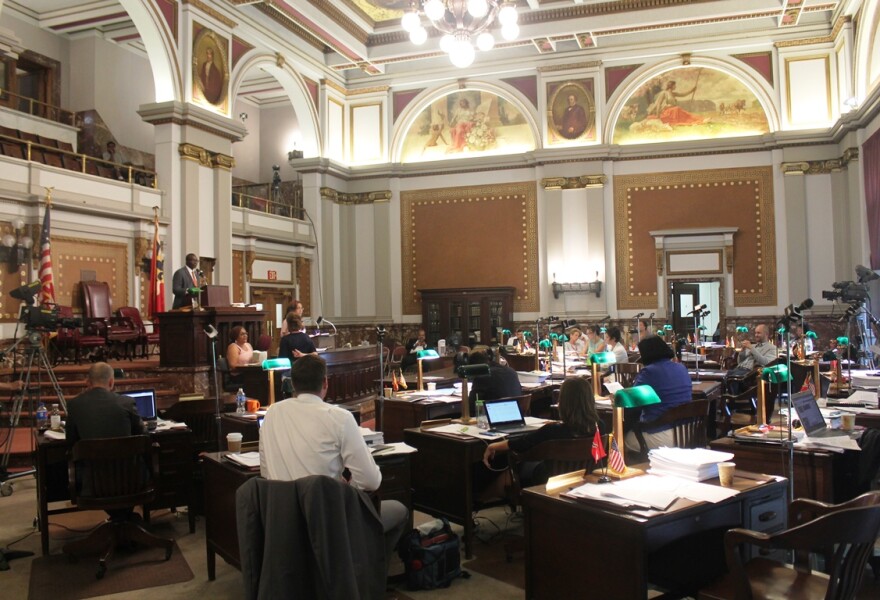The St. Louis Board of Aldermen heads back to City Hall Monday for the final day of the current session with several pieces of legislation hanging in the balance.
A protest buffer zone around medical facilities such as Planned Parenthood in the Central West End is the highest-profile measure still awaiting action. Supporters say buffer zone is needed to keep clinic patients and staff safe. Opponents call it a violation of the First Amendment.
The legislation has enough support to pass the Board, and Mayor Lyda Krewson is expected to sign it. But the margin is so narrow that almost all yes votes have to be in attendance. The sponsor of the buffer zone, Alderwoman Christine Ingrassia, D-6th Ward, delayed the vote twice because not enough people were there.
Alison Dreith, the executive director of the abortion rights group NARAL Missouri, said she did not believe the delays had caused any supporters to waver.
“I think worrying about all 16 of them showing up is the biggest concern we have at this point,” she said.
Dreith said she also believes the number of aldermen who support the policy behind buffer zones is larger than the number of people who will vote for the bill.
“Here in St. Louis it seems like a lot of folks legislate on pettiness or beefs, and maybe if we had a different sponsor, that this wouldn’t have taken so long or we would have gained some more support,” she said.
Dreith said she and her organization are set to fight for the buffer zone as many times as it takes.
“Historically, it takes seven years to pass this kind of policy, especially when it’s proactive and in the nature of helping Missouri women and families,” she said.
On tap
Aldermen on Monday are also likely to approve subpoena power for the Civilian Oversight Board, which reviews police discipline. Its executive director said members have never had trouble getting the information they need, but that access could become a problem if the board ever conducts its own investigation. But a separate measure that would have moved responsibility for investigating officer-involved shootings to the circuit attorney’s office never made it out of committee.
Also still pending is legislation that increases the percentage of work on certain projects that must go to minority and women-owned businesses, and institutes a penalty for developers that fail to comply.
Aldermen are also likely to approve additional incentives for the project at the site of the old Federal-Mogul foundry in Midtown. Efforts to ensure that projects receiving tax incentives also benefit the communities where they are built bogged down in political infighting, with both Alderwoman Megan Green, D-15th Ward and President Lewis Reed proposing their own versions of community benefit agreements. The two are likely to compete against each other in 2019 for the board presidency.
What will come back
The 2018-2019 session starts Tuesday. Any bill not sent to Krewson on Monday dies, and would have to be introduced again in the new session. As is tradition, the first major bill on tap is the budget for the next fiscal year. Aldermen are already looking at having to close a $14 million gap, although a recent court ruling that the way the city oversees its parking system is unconstitutional may affect upcoming negotiations over the city spending plan.
The board may also be asked whether to allow a private company to operate St. Louis-Lambert International Airport. Former mayor Francis Slay began exploring the privatization process shortly before he left office in 2017, and the Federal Aviation Administration accepted the application less than a week after Krewson was sworn into office. The city has selected three firms, including a non-profit affiliated with libertarian billionaire Rex Sinquefield, to evaluate potential lessees, though a contract has yet to be signed.

The session is also likely to be ripe with political jockeying. In addition to the board presidency, even-numbered seats are up for election in 2019. Three aldermen — Lisa Middlebrook, D-2nd Ward, Annie Rice, I-8th Ward and Tom Oldenburg, D-16th Ward — will all have to run for a full term. And unless a 2012 proposition that halves the Board of Aldermen after the 2020 census is undone, some aldermen may start looking at other political offices or more permanent jobs.
Follow Rachel on Twitter: @rlippmann



